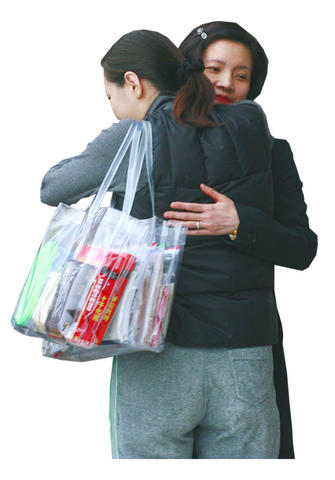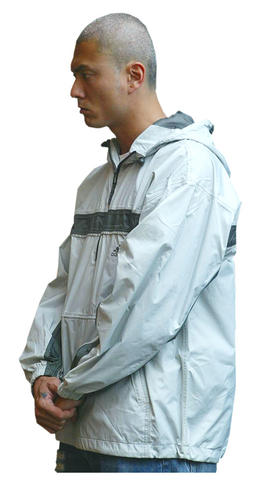In some countries getting smashed, going behind the wheel and running over a pedestrian would be grounds for a prison sentence. Taiwan, however, plays by a different set of rules. Here, at least for celebrity saucers, begging forgiveness publicly and handing over some cash seems to be the ticket to redemption.
A few weeks ago, Pop Stop reported that Hung Chi-te (洪其德) killed a woman in Kenting (墾丁) while driving under the influence. ETtoday reported last week that the disgraced entertainer, to demonstrate his remorse, attempted to pay the victim's family NT$3 million. Is that the going rate for a life in Taiwan?
Nope. It's NT$8 million, the price Shino Lin (林曉培) paid the family of the victim she ran over last year while wasted behind the wheel. The family of Hung's victim had the dignity to snub his offer.

PHOTO: TAIPEI TIMES
To show his "sincerity," ETtoday reports, Hung shaved off his hair. Does this action come from some traditional Taiwanese ritual, like beheading a chicken to resolve legal disputes? Nope. An allusion to monks shaving their heads when they renounce the world, perhaps? Guess again. Pop Stop is still trying to understand the thought process he underwent to come up with the idea.
Canadian-born Hong Kong actor Edison Chen's (陳冠希) saga continues to line the pockets of media barons. For those who have been hibernating through these cold winter months, 1,300 explicit images were stolen from Chen's computer showing the star and at least half a dozen Hong Kong stars in various sexual poses and posted on the Internet. In the resulting "sex scandal," Chen fled overseas, only to return to Hong Kong last week amid moralizing by the media and authorities, and rumors that he is on the triad's hit list.
Hong Kong's Oriental Daily (東方日報) reported that the police confiscated an additional 1,300 images of another seven women from Chen's computer. Do the dirty math.

PHOTO: TAIPEI TIMES
Meanwhile, bloggers are going crazy over the prospect that Jolin Tsai (蔡依林) might appear among the as-yet undistributed photos. Tsai, however, is unflustered. "What's there to be concerned about," she is quoted as saying in the United Daily News. "Nothing went on."
Chen, meanwhile, moved out of the apartment where many of the images were allegedly shot and into Hong Kong's Four Seasons Hotel as the police investigation continues, according to a report in the Liberty Times (the Taipei Times' sister newspaper). As luck would have it (for the paparazzi at least), so too did Cecilia Cheung (張柏芝), who appeared in erotic poses with Chen, and her husband, Nicolas Tse (謝霆鋒), who reportedly tried to pick a fight with Chen while both parties were dining separately in the hotel's restaurant.
Chen may at least stand to profit, monetarily, from the whole affair.
It turns out that under Hong Kong law, the Canto-pop star might be able to claim intellectual property rights over the photos. In an ironic twist, the tabloids that are making a mint off the images might be in for a legal surprise as Chen could sue the publications that have published the "artwork."
In a denouement to a previous sex scandal, Chu Mei-feng (璩美鳳) returned to Taiwan to forgive Scoop magazine publisher Shen Jung (沈嶸), who was just released from prison. Jung, followers of celebrity news may remember, was in the clinker because her magazine distributed a secretly filmed VCD of Chu, who was at the time the director of Hsinchu County's cultural affairs bureau, making the beast with two backs with Tseng Chung-ming (曾仲銘), a married businessman. Amidst much hugging and crying, Chu told Shen that all is forgotten. Edison Chen may find forgiveness less forthcoming.

US President Donald Trump may have hoped for an impromptu talk with his old friend Kim Jong-un during a recent trip to Asia, but analysts say the increasingly emboldened North Korean despot had few good reasons to join the photo-op. Trump sent repeated overtures to Kim during his barnstorming tour of Asia, saying he was “100 percent” open to a meeting and even bucking decades of US policy by conceding that North Korea was “sort of a nuclear power.” But Pyongyang kept mum on the invitation, instead firing off missiles and sending its foreign minister to Russia and Belarus, with whom it

When Taiwan was battered by storms this summer, the only crumb of comfort I could take was knowing that some advice I’d drafted several weeks earlier had been correct. Regarding the Southern Cross-Island Highway (南橫公路), a spectacular high-elevation route connecting Taiwan’s southwest with the country’s southeast, I’d written: “The precarious existence of this road cannot be overstated; those hoping to drive or ride all the way across should have a backup plan.” As this article was going to press, the middle section of the highway, between Meishankou (梅山口) in Kaohsiung and Siangyang (向陽) in Taitung County, was still closed to outsiders

Many people noticed the flood of pro-China propaganda across a number of venues in recent weeks that looks like a coordinated assault on US Taiwan policy. It does look like an effort intended to influence the US before the meeting between US President Donald Trump and Chinese dictator Xi Jinping (習近平) over the weekend. Jennifer Kavanagh’s piece in the New York Times in September appears to be the opening strike of the current campaign. She followed up last week in the Lowy Interpreter, blaming the US for causing the PRC to escalate in the Philippines and Taiwan, saying that as

The Chinese Communist Party (CCP) has a dystopian, radical and dangerous conception of itself. Few are aware of this very fundamental difference between how they view power and how the rest of the world does. Even those of us who have lived in China sometimes fall back into the trap of viewing it through the lens of the power relationships common throughout the rest of the world, instead of understanding the CCP as it conceives of itself. Broadly speaking, the concepts of the people, race, culture, civilization, nation, government and religion are separate, though often overlapping and intertwined. A government